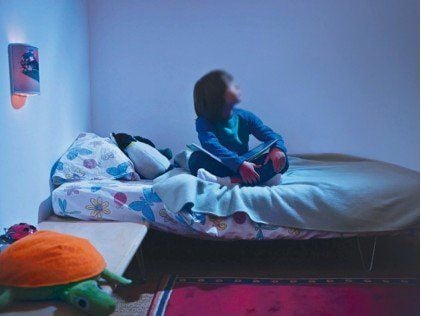This is an automatically translated article.
The article was professionally consulted with Master, Doctor Phan Ngoc Hai - Doctor of Pediatrics - Neonatology - Department of Pediatrics - Neonatology - Vinmec Danang International General Hospital.1. Infant sleep
Often, in practice, babies sleep a lot during the day as well as at night and only wake up to eat every few hours of sleep. It is often difficult for first-time parents to understand when and how often babies sleep. At first, babies' sleep does not follow a specific schedule, even many babies often sleep more during the day and are constantly awake and crying at night.Normally, babies sleep a total of about 8 to 9 hours during the day and an additional 8 hours at night. However, due to the small stomach, they often wake up every few hours to eat. Most babies don't sleep consistently for 6 to 8 hours a night until they're 3 months old, and in some cases, they'll stay up all night until they're 1 year old.
In most cases, your baby will wake up and be ready for a meal every three hours of sleep. However, how often your baby is awake can vary, depending on what he is being fed as well as his age. Because the stomach structure is not large enough to hold a lot of food, so parents are also recommended to give their children many small meals even if they do not ask to eat to ensure adequate nutrition for the growth. children's development.

2. 5 things you didn't know about infant sleep
2.1. Some babies stay up all night and sleep a lot during the day Many babies have daytime and nightly sleep disturbances, even reversing their daytime sleep patterns and staying awake at night. They are usually sedentary, spend more time sleeping during the day and more awake at night. Those are the words of Dr. Charles Shubin, chief of pediatrics at Mercy Family Care Hospital in Baltimore. He affectionately called these children "little owls".A child who stays up at night is often active, eats and requires loving care from adults, leaving parents increasingly exhausted. This can be very difficult for adults, because the body's normal circadian rhythms are not geared for staying up all night. That is the reason why the daytime shifts of these parents are difficult and often not very effective.
What they can do is try to nap during the baby's sleep times and rest assured that this phase will pass. A child's nighttime awakening is only temporary. When their brain and central nervous system are fully developed, sleep cycles will last longer and babies will sleep more at night. Most babies will adjust their sleep time according to the family schedule in about 1-3 months or so but usually not more than 1 year.

2.2. Infant sleep is erratic and elusive In the first weeks after birth, babies can sleep a lot, up to 16-18 hours a day. However, there is a problem that they will not sleep more than 4 hours per sleep, day or night.
Newborns usually sleep 14-18 hours a day during the first week and 12-16 hours when they are one month old. Many children will sleep a little more or a little less than these values. Unfortunately, despite sleeping a lot, babies also need to be fed several times a day, including at night, which results in sleep deprivation for mothers.
In a recent BabyCenter survey, 71% of mothers revealed that lack of sleep is the most difficult part of childbirth. Mothers can completely blame the lack of energy on the fluctuations in the baby's sleep. The first 9 weeks are always the hardest, sometimes moms have about 4 hours of sleep before they have to get up to feed their babies but sometimes it's time for them to wake up every hour.

2.3. Newborns don't need a quiet space to sleep Newborns can sleep in the loudest, brightest places, which is not surprising when compared to the 9 months a baby spends in the womb. mother. In fact, the uterus is not a quiet place as many people think. The sounds from the heartbeat, digestive system and other functions of the mother's body are really quite loud. However, in order to help your baby sleep better, more easily, there needs to be a clear bedtime routine that combines a quiet, low-light environment that can incorporate repetitive sounds such as white noise, waterfall...
Many babies sleep better when surrounded by repetitive sounds such as a fan or washing machine... Newborns are too young to be distracted by any element, including a nice toy or stories from others. They simply sleep whenever they want.

2.4. Newborns have their own unique ways of sleeping. There are differences between each child in the way they sleep, just like adults do. Parents of many infants often notice these differences very early on. Many mothers say that their first baby usually sleeps very well, but the second baby sleeps a lot and the time for each sleep is also much shorter.
This also partly shows the child's personality, many babies are more determined and want to resist sleep while others are more easygoing to accept it naturally
2.5. Newborns need a safe sleeping space Our previous generations were often not too concerned with the space for babies to sleep. However, things are slowly changing. The fact that children are sleeping in a reasonable environment will bring much more safety. The safest sleeping position and space for babies is lying on their backs on a flat mattress.

Infant sleep is much different from adult sleep. Newborns need a lot of sleep, especially in the first few weeks after birth. However, children's sleep is relatively short and usually does not last more than 4 hours because babies need to eat to provide nutrients for growth. Parents also do not need to be too worried in case their child sleeps more or less than usual or sleeps during the day and stays up at night. This condition will soon improve as the child's central nervous system gradually matures. What needs to be done is to create a space for your baby to sleep in a suitable and safe way.
Sleep plays a very important role in the development of children physically and intellectually. Therefore, knowing the characteristics of infant sleep will help parents take better care of their children, ensuring their children have quality sleep.

In addition to taking care of children's sleep, parents should pay attention to nutrition to improve children's resistance. At the same time, add supporting foods containing lysine, essential micro-minerals and vitamins such as zinc, chromium, selenium, B vitamins,... snacks and less digestive problems.
Parents can learn more:
Why do you need to supplement Lysine for your baby?
The role of zinc - Guidelines for reasonable zinc supplementation
Please visit the website Vinmec.com regularly and update useful information to take care of your baby and family.
Please dial HOTLINE for more information or register for an appointment HERE. Download MyVinmec app to make appointments faster and to manage your bookings easily.
References: stanfordchildrens.org, babycenter.com














